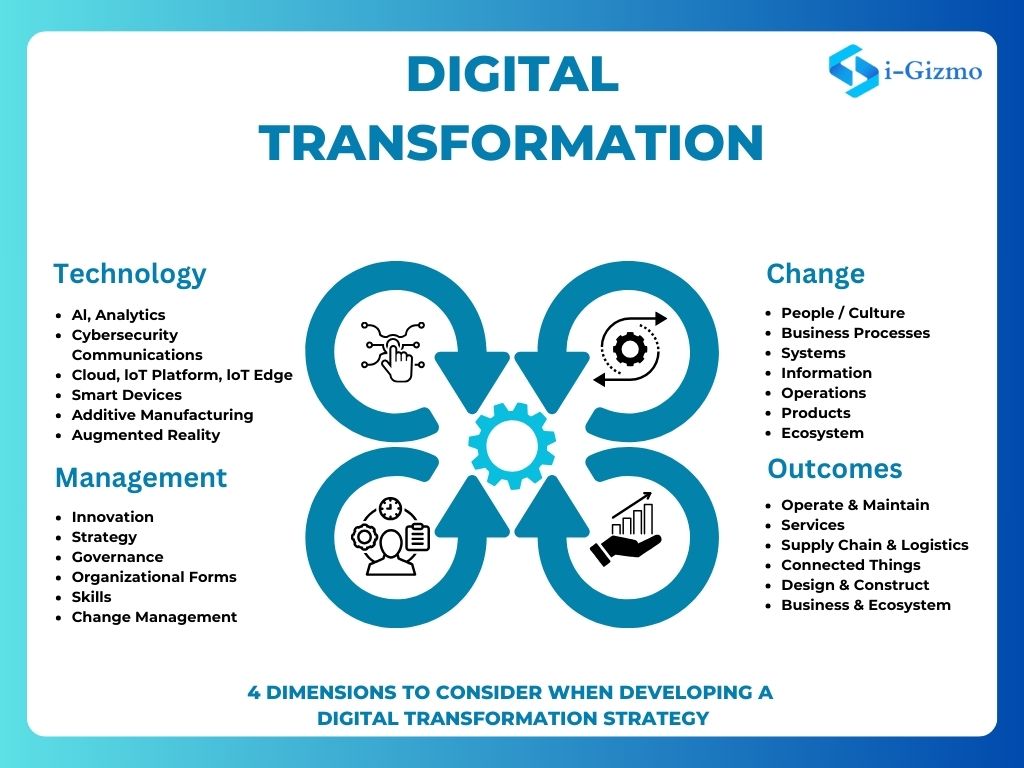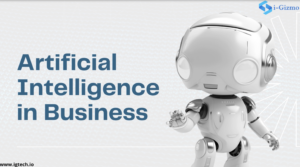In today’s rapidly evolving technological landscape, businesses must adopt “Digital Transformation” strategies to remain competitive, efficient and customer-centric. At i-Gizmo, we understand the multifaceted nature of this transformation. We propose the 4 critical dimensions to consider when developing a robust digital transformation strategy: Technology, Management, Change and Outcomes.
Technology
The foundation of digital transformation lies in leveraging advanced technologies to innovate and optimize business processes. Key technological components include:
- AI and Analytics: Utilizing artificial intelligence and data analytics to drive insights, improve decision-making and enhance customer experiences.
- Cybersecurity: Ensuring robust security measures to protect sensitive data and maintain trust.
- Communications: Implementing advanced communication tools to facilitate seamless collaboration.
- Cloud and IoT Platforms: Adopting cloud computing and IoT edge platforms to enable scalability, flexibility and real-time data processing.
- Smart Devices: Integrating smart devices to enhance connectivity and automation.
- Additive Manufacturing and Augmented Reality: Embracing new manufacturing technologies and immersive experiences to streamline production and training processes.
Management
Effective management is crucial for steering digital transformation initiatives. This involves:
- Innovation: Fostering a culture of innovation to continually explore new ideas and solutions.
- Strategy: Developing comprehensive strategies that align with organizational goals and market demands.
- Governance: Establishing governance frameworks to ensure compliance and accountability.
- Organizational Forms: Adapting organizational structures to support agility and responsiveness.
- Skills: Investing in skill development to empower employees with the knowledge and tools needed for digital transformation.
- Change Management: Implementing change management practices to smoothly transition from traditional methods to digital solutions.
Change
Digital transformation necessitates changes across various facets of the business:
- People and Culture: Cultivating a culture that embraces change and innovation.
- Business Processes: Redesigning business processes for greater efficiency and effectiveness.
- Systems: Upgrading and integrating systems to support new technologies.
- Information: Enhancing data management and utilization for informed decision-making.
- Operations: Streamlining operations to improve productivity and reduce costs.
- Products and Ecosystem: Innovating products and expanding the ecosystem to meet evolving customer needs.
Outcomes
The ultimate goal of digital transformation is to achieve tangible outcomes that drive business success:
- Operate and Maintain: Ensuring smooth operation and maintenance of digital systems.
- Services: Enhancing service delivery and customer satisfaction.
- Supply Chain and Logistics: Optimizing supply chain and logistics through digital solutions.
- Connected Things: Leveraging IoT to create interconnected systems for real-time monitoring and control.
- Design and Construct: Utilizing digital tools for efficient design and construction processes.
- Business and Ecosystem: Strengthening the overall business ecosystem to create sustainable growth and competitive advantage.
i-Gizmo’s “Digital Transformation” is not just about adopting new technologies; it’s about reimagining how the business operates and delivers value to our esteemed Clients. By focusing on these 4 dimensions—Technology, Management, Change and Outcomes—businesses can navigate the complexities of Digital Transformation and emerge stronger and more resilient.
At i-Gizmo, we are committed to guiding our Clients through this transformative journey. Let us help you harness the power of Digital Transformation to drive innovation, efficiency and growth in your Organization.
Feel free to reach out to us for more insights and support on your Digital Transformation journey.
#DigitalTransformation #Innovation #Technology #BusinessStrategy #FutureOfWork #AI #IoT #CloudComputing #Cybersecurity #BusinessGrowth




